Meet Our Team
The RAIL group includes physicians, engineers, scientists and students from across Johns Hopkins University who are working to advance the field of artificial intelligence in imaging informatics.
LEADERSHIP
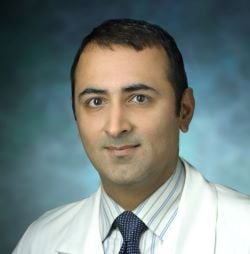
Haris Sair, MD
Dr. Haris Sair is Professor in the Johns Hopkins Medicine Department of Radiology and Radiological Science, and the Director of the Division of Neuroradiology. His areas of clinical expertise include functional Magnetic Resonance Imaging (fMRI) of the brain. Dr. Sair earned his M.D. from Duke University School of Medicine. He completed his residency at Temple University Medical Center and performed a fellowship in neuroradiology at Massachusetts General Hospital in Boston, MA.

Craig Jones, PhD craigj@jhu.edu
Dr. Craig Jones is a Research Scientist in the Malone Center for Engineering in Healthcare (Whiting School of Engineering). He has an undergraduate degree in Mathematics and Computing Science and a PhD in Physics (Medical Physics). He has over 25 years experience in medical image processing (primary focus in MRI), data fitting and data science. His current work is in artificial intelligence and neural network image processing of MRI, CT, OCT datasets (both 2D and 3D) with classification, regression and segmentation projects.
Member of SPIE
Member of SIIM
Past Founding Directors

Ferdinand Hui, MD
Dr. Ferdinand Hui is Associate Professor of Radiology and Radiological Science in the Johns Hopkins Medicine Neuroradiology division. Dr. Hui received his MD from University of Virginia School of Medicine He completed his residencies at Ronald Reagan UCLA Medical Center and Virginia Commonwealth University Health System and performed a fellowship in Diagnostic Neuroradiology and Interventional Neuroradiology at Emory University School of Medicine.

Gregory D. Hager, PhD
Gregory D. Hager is the Mandell Bellmore Professor of Computer Science at Johns Hopkins University, and holds joint appointments in the Department of Electrical and Computer Engineering and the Department of Mechanical Engineering. Hager is known for his research on collaborative and vision-based robotics, time-series analysis of image data, and medical applications of image analysis and robotics. He has published more than 300 articles and books on these topics. Hager is the founding director of the Johns Hopkins Malone Center for Engineering in Healthcare, an interdisciplinary research center aimed at developing innovative healthcare technology and systems.
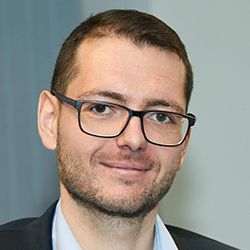
Mathias Unberath, PhD
Mathias Unberath is an Assistant Research Professor in the Department of Computer Science at Johns Hopkins University, affiliated with the Laboratory for Computational Sensing and Robotics and the Malone Center for Engineering in Healthcare. His research consolidates efforts in computer vision, medical physics, and medicine to develop surgeon-centric, end-to-end computer-assisted solutions for image-guided surgery.
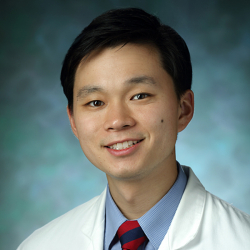
Paul Yi, MD
Paul Yi is Resident Physician in Radiology at Johns Hopkins University School of Medicine. Dr. Yi received his BA in Medical Sciences (Summa Cum Laude) and MD from Boston University through the Seven-Year Accelerated Medical Program. Dr. Yi’s current research interests include the development and application of artificial intelligence and deep learning towards medical imaging applications, with particular interest in neuroradiology and musculoskeletal radiology.
Graduate Students
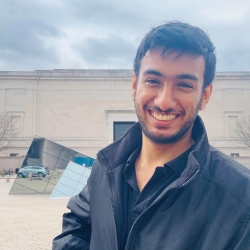
Saicharan Balamurali, BE
Saicharan is an MSE in Robotics student at LCSR, Johns Hopkins University with a track specialization in perception and cognition. He graduated with a Mechanical Engineering degree from BITS Pilani, India in 2018 and is now working on applying deep learning techniques for intracranial vessel wall segmentation.
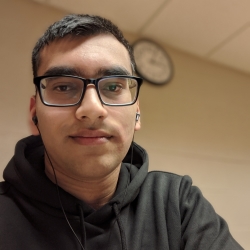
Andrew Cornelio, BSc
Andrew is a researcher at the Wilmer Eye Institute. He graduated from Johns Hopkins University in 2021 with a BSc in applied mathematics and a minor in computer science. His current interests include computer vision, signal processing, and machine learning. Optical coherence tomography angiography (OCT-A) is a non-invasive, 3D imaging technique for analyzing retinal diseases such as diabetic retinopathy and age-related macular degeneration. So far, most OCT-A studies of retinal microvasculature have focused on only 2D en-face projection images. The goal of this project is to utilize all the data to visualize and analyze the full 3D vessel structure.

Anqi Feng, BSc
Anqi is an MSE student in the Biomedical Engineering department at the Whiting School of Engineering. Before arriving at Johns Hopkins University, she achieved her bachelor’s degree in Biomedical Engineering at Northeastern University. She is interested in computer vision, medical imaging, and image processing. Now, she is working on a project associated with vessel wall segmentation.
Alumni
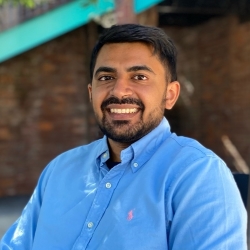
Sohaib Naim, MSE
Sohaib was a Biomedical MSE student at the Whiting School of Engineering with a track specialization in imaging and medical devices and had interests in machine learning applications with medical imaging data. He graduated from Johns Hopkins University with a thesis-based MSE. He worked with Dr. Craig Jones and Dr. Haris Sair on his thesis project applying machine learning techniques to train an image classification model on mini-batches of data that arrive sequentially over time, otherwise known as sequential learning. Sohaib is currently pursuing his PhD studies at the University of California Los Angeles Physics and Biology in Medicine Graduate Program.
